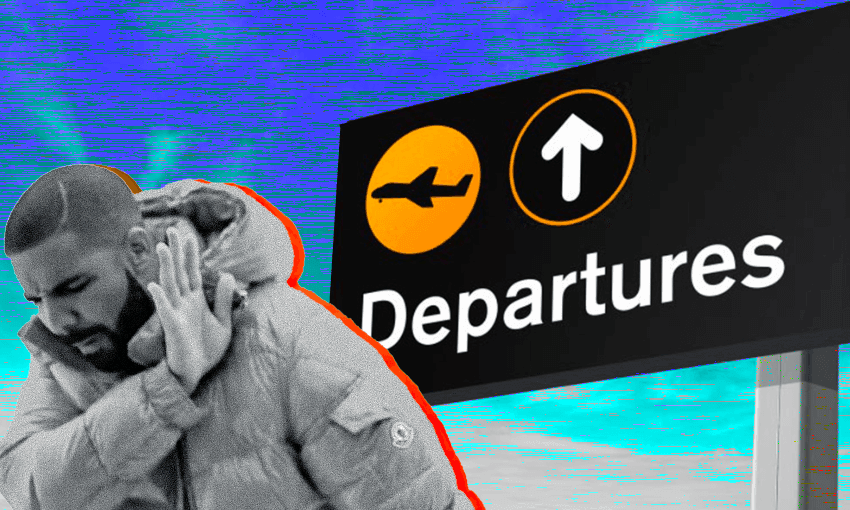The decision comes as every last person leaves the country and talks to a reporter on the way out.
Despite recent reports of New Zealanders fleeing the country for the green, green pastures of Australia, some residents have made the difficult and potentially foolish decision to stay. After not much thought, Sarah Firmston won’t be moving her recycled clothing boutique Crushes to Australia, saying all her stuff is here and packing is annoying.
The decision to stay in New Zealand is personal too: Firmston personally likes it here. “I feel comfortable in New Zealand, it moves at the pace I enjoy for both my business and for me personally. Slow and steady (hopefully) wins the race. Plus packing is a bitch,” she said.
Firmston’s defiant remarks come amid fears that recent residency pathway changes in Australia would result in a “Kiwi mass exodus”, with New Zealanders opening their eyes to the wages, weather and house prices of our closest neighbour. The changes came into effect last month and require four years of residency in Australia.
But some have decided to move. Ben Cook, local rich-lister, told the front page of the Weekend Herald that he was moving. In fact, he’d already moved. In fact, he’d only spent four weeks of the past two years in New Zealand due to owning a house in Sydney since 2021. But still, it was a sure sign of New Zealand’s bleak future.
Firmston, one of many low-profile business people still living in New Zealand, has not owned a home in Sydney for 20 years and is choosing to simply stay where she is.
Local business owner Tamzyn Adding is also moving, telling the Herald that the new education curriculum was “the straw that broke the camel’s back”. Firmston said she would not be inspired to leave the country in response to the education curriculum.
Another brave and patriotic soul is artist Pepper Raccoon, who said it would be very inconvenient for her to move as all her business contacts are here.
“My main reason is that I have the most dedicated, loyal audience for my work that I can personally connect with and grow with, often in person at events, and I don’t feel like I would find that anywhere else.”
She said other countries are often toxic environments.
“I am very much enjoying not being in close proximity to any kind of large venomous spider. It is also helpful to my business as an artist to not die due to climate change-influenced civil war,” she said while staring in the general direction of the US, before adding, “Americans and Australians are mean to me.”
Firmston and Raccoon’s decisions come as pressure piles on the government in an election year, with some reporting playing up the notion that New Zealand is a country with a bleak future. That view has been compounded by criticism from the likes of former All Black Marc Ellis (as reported by the Herald) and broadcaster Paul Henry (as reported by the Herald).
Firmston and Raccoon stand defiantly on New Zealand soil, despite Stuff reporting on Tuesday that a new study showed 64.5% of New Zealanders said a firm “no” when asked if they would consider, just for a moment, moving to Australia (26% said “maybe”).
While it’s widely acknowledged that New Zealand has lost its mojo, migration to Australia has simply returned to pre-Covid levels, while net migration on the whole is in the positives, with more migrants from all over the world moving to Aotearoa. Perhaps the more pressing question is: why don’t Australians specifically want to move here? Don’t they want to be on the front page of the national paper?
In a column last weekend, commentator Damien Grant blamed those sorts of figures on New Zealand being too tough on rich people.
“The problem for those who wish to build an economic system based on increasing taxation and more comprehensive regulation is that Kiwis retain a powerful freedom – the ability to leave.
“The more we tax the rich and reduce the prospects for those who wish to build a career, the more attractive Australia becomes,” he wrote.
In Australia, workers get to enjoy policy settings such as 37% tax on income over $120,000, 45% tax on income over $180,000, stamp duty, compulsory employer superannuation contributions, a more comprehensive capital gains tax, and an entrenched collective bargaining system similar to Fair Pay Agreements, supported by stronger unions.
Those policies set the table for a $18,200 tax-free threshold for all workers, a larger and more well-funded public healthcare system, and higher wages across the board.
These policies are typically not cited when New Zealanders are interviewed while sprinting through international departures towards their new home on the Gold Coast.
Prime minister Chris Hipkins has ruled out changing New Zealand’s tax policies to more closely mirror Australia’s, saying people are doing terribly right now and need certainty things will stay that way. Firmston and Raccoon are two such people, refusing to jump on the gravy train across the sea. May god have mercy on their souls.




